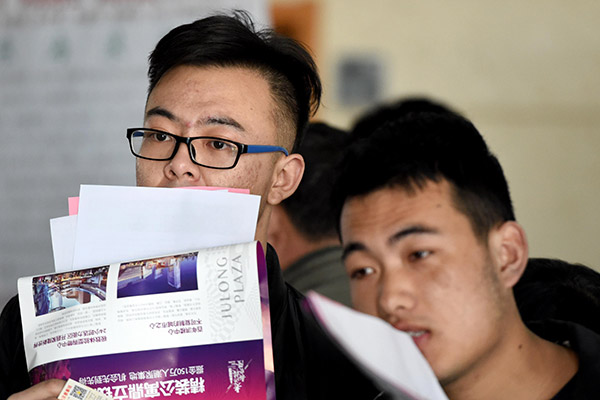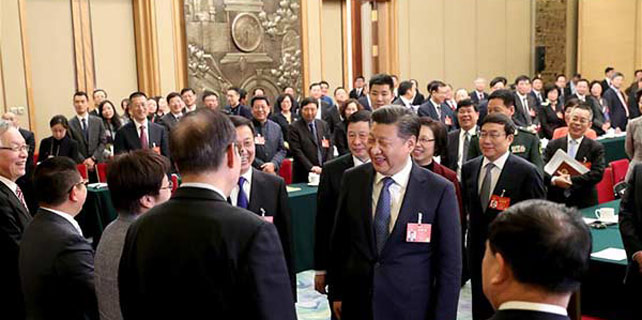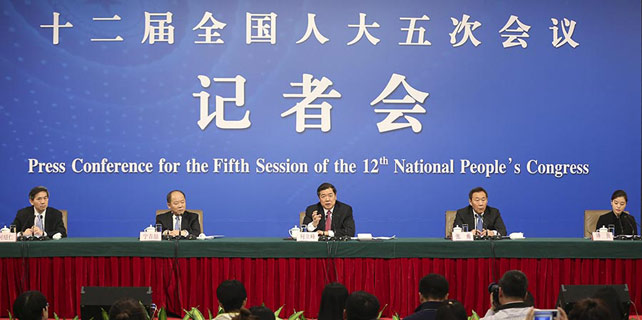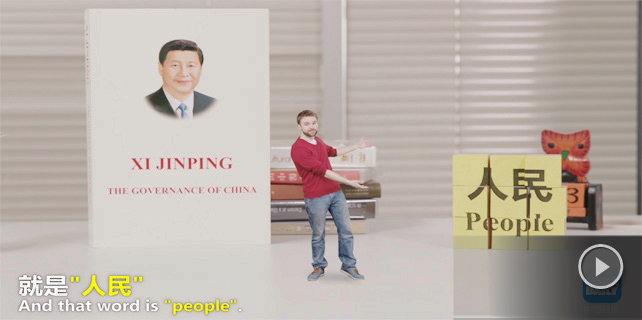Jobseekers face hiring freeze
 |
|
Jobseekers talk with representatives of an employer at a job fair in Beijing in Feb 2017. [Photo/China Daily] |
Against a backdrop of slowing growth, companies are not looking to recruit, and some are even downsizing
Spring is traditionally the time when people seek to change jobs, having collected their annual bonus for the previous year.
This year, fluctuations in different sectors' employment demand are sending mixed messages to potential recruits.
The rapid development of internet and advanced technologies are giving birth to a large number of new job opportunities and are prompting companies to map out plans to increase technology talent.
Online finance, including peer-to-peer lending, is expanding rapidly in China. Therefore, a number of information technology related jobs will be created in the process. Businesses in other sectors have also invested in more IT positions to drive growth.
With the boom of e-commerce in China, consumers are increasingly shopping online. Therefore, traditional retail companies have been reducing headcount recently and even shutting down their operations in China. As this trend is expected to continue in 2017, people who used to work in traditional retail businesses, especially those in the luxury sector, will enter the e-commerce sector.
Candidates with digital marketing and sales experience will be highly pursued this year, according to Morgan McKinley.
Cui Libiao, researcher of Hangzhou-based China E-commerce Research Center, said: "Candidates with operational experience are the most urgently needed at e-commerce companies, while marketing talent are also in short supply. As the industry is still expanding rapidly, the candidate shortage is still quite serious."
Meanwhile, a large number of companies specializing in artificial intelligence have been created lately. These companies are actively pursuing individuals with such expertise, according to Morgan McKinley.
 |
|
Fresh graduates take part in one of the first spring recruitment fairs in Shandong province in February, 2017. [Photo/Xinhua] |
The latest job ad posted by internet giant Baidu Inc shows that the company is looking for artificial intelligence talent for the man-computer conversation, maps and autopilot businesses.
Another industry leader Tencent Holdings Ltd has also been searching lately for talent specializing in AI product planning, AI machine learning and AI research engineers.
On the other hand, some companies will remain cautious this year when it comes to recruitment plans in supporting departments, such as finance, accounting or human resources, according to the Chinese Mainland Salary Guide 2017-a report released by the international employment agency Morgan McKinley in mid-February.
Rio Goh, managing director of Morgan McKinley China, said: "When economic growth slows down, it is not unusual to see companies adopting a cautious attitude when it comes to hiring or reducing hands."
Owing to cost cutting and operational consolidations, foreign banks started reducing headcount in China and the wider Asia-Pacific region since the second quarter of 2016. In 2017, these banks will remain cautious about hiring.
Although Chinese banks are hiring more than their foreign counterparts, they have also felt the effect of tough business conditions and lower margins. So, some of them are scaling back recruitment or even restructuring and making redundancies.
Employee downsizing has already started in leading commercial banks in China. According to the interim report of China Merchants Bank released in late June 2016, its headcount dropped to 68,424 from 76,192 one year earlier.
Similarly, Industrial and Commercial Bank of China reported a headcount of 458,711 at the end of June last year, reducing its workforce by 7,635.
Song Chen, a consumer finance account manager at a commercial bank in Beijing, was told recently that he might be transferred to a community branch, and no longer be responsible for consumer finance.
Song said: "If I'm transferring from a previously well-known position to a less familiar one, my salary, bonus, and even annual target would change."
Multinational companies this year will restrict themselves to replacement hires when it comes to accounting and financial roles. They may even choose not to fill vacancies after some staff members leave, expecting the rest of the team to pick up the workload, according to Goh.
Similarly, as a support function, human resources teams, especially those within the multinational companies, are expected to be leaner and more efficient. Traditional industries, such as consumer goods, manufacturing and pharmaceuticals are likely to make fewer hires in human resources in 2017, added Goh.









